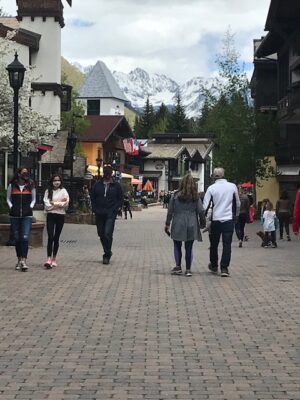Colorado ski towns look to rebound from COVID-19 economic shutdown

RockyMountainPost.com produced the following 3,000-word cover story for Colorado Politics analyzing the challenges facing Colorado ski towns during the ongoing COVID-19 pandemic. This is a short excerpt.
For the full story, including interviews with public policy experts, ski-industry analysts, politicians and business owners, go to Colorado Politics.
VAIL, Colo. – The mayors of Colorado’s top two ski towns in terms of annual skier visits – Eric Mamula of Breckenridge and Dave Chapin of Vail — have a lot in common. They’re both restaurateurs deeply concerned about their essential workers. They’re both working hard on economic recovery. And they both know COVID-19 all too well.
Chapin because he actually contracted and recovered from the disease caused by the novel coronavirus and Mamula because he recently had to temporarily shut down his Main Street restaurant, Downstairs at Eric’s, because several employees tested positive for the disease.
The ski area above the town Mamula has called home for 34 years was supposed to stay open until Memorial Day but shut down abruptly at the peak of spring break in mid-March when the pandemic swept through Colorado’s high country.
Now after two and half months of lockdown and at the traditional kickoff to summer, Breckenridge is slowly reopening for some semblance of business, but Mamula is still very worried about both the town’s coming summer season and its financial bread and butter, next ski season.
“We’re just going to be off all over the place,” Mamula said. “Business will be down, and things will be weird, and hopefully we won’t get shut down again or we’ll be in this like rolling shutdown sort of circumstance where I’m closed for two weeks because of an outbreak and the guy down the street is closed the following two weeks because of an outbreak.”
Even as more and more areas of the state allow restaurants to open indoors up to 50% of capacity, with more seating outside – as long as it’s socially distanced – Mamula is having a hard time looking into his crystal ball at what the coming ski season will look like, when the weather turns colder and the virus possibly enjoys a second, stronger wave.
“The ski area will probably have some weird lift line restrictions where you can only ride on the lift with your family like they were doing right at the end there [in March],” Mamula said. “It’s one of those things where I’m trying not to look too far out because it gets sort of depressing to see where we’re going.”
Even as its Summit County neighbor Arapahoe Basin announced it would reopen for very limited skiing on May 27, Breckenridge had shifted its thinking toward summer season and a walkable Main Street concept that would close several blocks of the historic downtown to vehicle traffic and allow restaurants and retail to spread out onto the street.
Vail, which already has a pedestrian village, has expanded its liquor laws to allow for socially distanced public consumption in Vail Village, but all the big music, food and sports festivals have been cancelled this summer, and the traditional Fourth of July parade will likely be stationary – begging the question, is that really even a parade?
Vail Resorts, the ski company that owns and operates both Vail and Breckenridge, offered a glimmer of hope recently when CEO Rob Katz wrote in an open letter that the company wants to have its chairlifts and gondolas running for summer activities starting in late June or early July.
“We intend to take our time to reopen,” Katz wrote, “and we acknowledge that we may be slower to open than others. Our goal is not to win the race to reopen, it’s to look back one day with great pride in our track record on safety.”
In his Epic By Nature podcast, however, Katz admitted to some serious trepidation about what it will mean to reopen for business and to some degree welcome back the world.
“I am worried about the future; I think it would be impossible not to be worried,” said Katz, who pioneered the multi-state, multi-national, season-long Epic Pass. “There’s still so many unknowns. I don’t think I’ve ever felt so much uncertainty at any given point in my career.”
For the full story, go to Colorado Politics.


Latest posts by David O. Williams (see all)
- During National Small Business Month, Target, DreamSpring put funding bullseye on underrepresented communities in Denver area - May 29, 2025
- Colorado senator urges Supreme Court to hold Trump administration in contempt on deportations - April 19, 2025
- Conductor who brought back Colorado ski train wants to use rail to save state’s highways for skiing - March 20, 2025

You must be logged in to post a comment Login